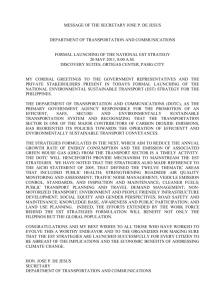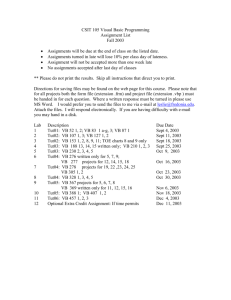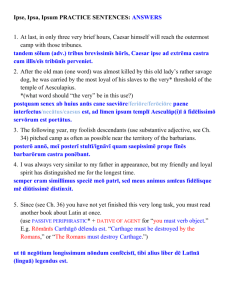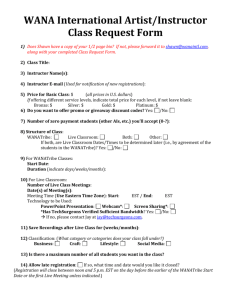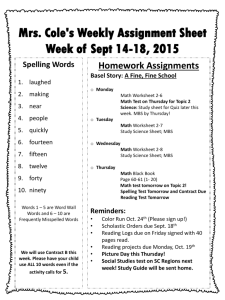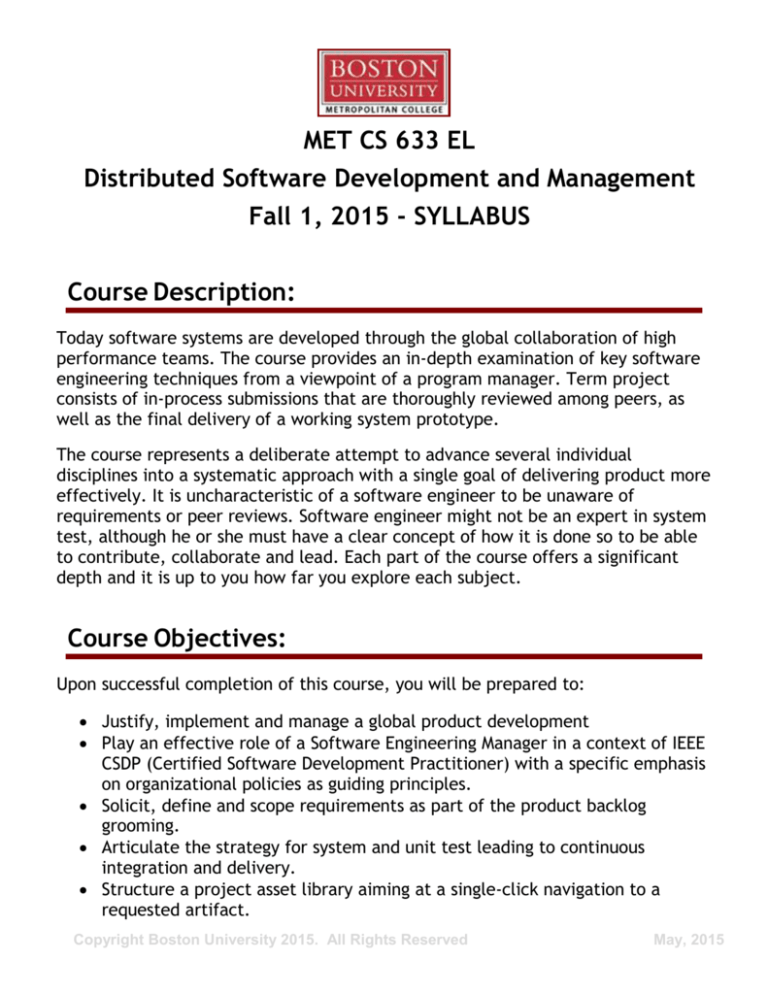
MET CS 633 EL
Distributed Software Development and Management
Fall 1, 2015 - SYLLABUS
Course Description:
Today software systems are developed through the global collaboration of high
performance teams. The course provides an in-depth examination of key software
engineering techniques from a viewpoint of a program manager. Term project
consists of in-process submissions that are thoroughly reviewed among peers, as
well as the final delivery of a working system prototype.
The course represents a deliberate attempt to advance several individual
disciplines into a systematic approach with a single goal of delivering product more
effectively. It is uncharacteristic of a software engineer to be unaware of
requirements or peer reviews. Software engineer might not be an expert in system
test, although he or she must have a clear concept of how it is done so to be able
to contribute, collaborate and lead. Each part of the course offers a significant
depth and it is up to you how far you explore each subject.
Course Objectives:
Upon successful completion of this course, you will be prepared to:
Justify, implement and manage a global product development
Play an effective role of a Software Engineering Manager in a context of IEEE
CSDP (Certified Software Development Practitioner) with a specific emphasis
on organizational policies as guiding principles.
Solicit, define and scope requirements as part of the product backlog
grooming.
Articulate the strategy for system and unit test leading to continuous
integration and delivery.
Structure a project asset library aiming at a single-click navigation to a
requested artifact.
Copyright Boston University 2015. All Rights Reserved
May, 2015
Play a role in a peer review, request and provide constructive and concise
comments.
Support the Scrum delivery framework and become aware of several Agile
certification paths.
Select an estimation method that is appropriate for a specific phase of a
product life cycle. Oversee adoption of a consistent methodology to narrow
the Cone of Uncertainty.
Evaluate software development tools (approved, allowed, restricted), while
following the Magic Quadrant technique.
Provide leadership to a process program that is using SEI CMMI as an
improvement model.
Course Resources:
There are several books referenced throughout the course. These books are optional. You do not need to purchase
them. Most of the course concepts are expounded through the class notes comprised of some two hundred pages. You
will be also required to search through various on-line resources.
1. Ebert, C. (2011). Global software and IT: A guide to distributed development, projects,
and outsourcing. Wiley-IEEE Computer Society Press. (ISBN-13: 9780470636190 | ISBN10: 047063619X). Christof Ebert book has a wealth of information on distributed
development and outsourcing. Dr. Ebert has authored over 150 scientific publications, serves
on a number of advisory and industry bodies, e.g. editorial boards of IEEE Software
magazine. He teaches at the University of Stuttgart.
2. Steve McConnell, (2006) Software Estimation: Demystifying the Black Art. Redmond, Wa.:
Microsoft Press, ISBN: 0735605351. Steve McConnell is a well-known industry practitioner,
Chief Software Engineer at Consrux. Software Development magazine named Steve one of the
three most influential people in software industry along with Bill Gates and Linus Torvalds.
Steve's book on estimation is available in electronic form and could be delivered instantly.
3. Bose, I., Huang, M-H., & Huang, M. (2006). Jharna Software: The move to Agile. Harvard
Case No. HKU613.This case study is used in one of the assignments, where you will apply
elements of quantitative analysis and systematic decision making toward Agile methodology.
Many organizations are looking for a clear path to improve their product delivery with Agile.
Copyright Boston University 2015. All Rights Reserved
May, 2015
Instructor:
Alex Elentukh
Email: elentukh@bu.edu
Tel: (617) 335-6135
Office Hours & Questions: You will have ample opportunity for questions during
class or through email. In addition, I will be available to stay late after class.
Finally, I am available for ad-hoc conference call discussions upon request. Do not
be surprised to receive a call from me, as I am always interested to learn what are
you thinking.
My name is Alex Elentukh, and I will be your instructor for the course. To give
you a little background about myself, during my 25 years professional career I
taught various software-engineering courses at Boston and Northeastern
University and authored numerous papers on quality assurance and software
reliability. Most recently taught the MET CS 473 and MET CS633. At EMC, as an
Agile coach, I introduced the backlog grooming to improve collaboration
between product owners and engineering. As an enterprise architect at Fidelity,
I managed the regression-intensive verification used by multiple scrums, cutting
the field complaint rate by fifty percent. I also held the positions of QA director
at two successful start-ups, Jupiter and Reveal.
Most importantly, I'm here to help - if you have any questions or need anything
at all during the course, please don't hesitate to contact me…the most
effective way is via email.
Copyright Boston University 2015. All Rights Reserved
May, 2015
Course Grading Information:
Grade Weighting & Grade Conversion:
The following table summarizes the five kinds of graded items along with
their weight.
DELIVERABLE
WEIGHT
In-Class Discussion Participation
Providing comments to peers
10%
Quizzes
10%
Assignments
20%
Term Project
30%
Final Exam
30%
The following table details the translation on a numerical grade to a
letter grade.
LETTER GRADE
NUMERICAL GRADE
A
>=95 – <=100
A-
>=90 - <95
B+
>=85 - <90
B
>=80 - <85
B-
>=77 - <80
C+
>=74 - <77
C
>=70 - <74
C-
>=65 - <70
Copyright Boston University 2015. All Rights Reserved
May, 2015
In-Class Discussion Participation:
A large part of the overall learning experience is gained through discussions and
participation amongst the class. The intent here is to encourage a meaningful
participation during lectures and through the discussion board. You are expected to
post your comments toward several predefined topics.
Providing Comments to Peers:
All in-process artifacts (e.g. requirements and test cases), as well as the final
deliverable (code), shall be peer reviewed. Providing constructive and concise
comments is a part of the defined process elaborated in the class. Each student
actively participates in peer reviews, submits a predefined deliverable and
incorporates suggested changes from peers.
Quizzes
Quizzes in this course are an important method to learn new material. Quizzes
complement other methods, assignments, discussions, and term project. Quizzes
offer a slightly different path and angle toward the same course concepts. Yes&No
answers bear no judgment. They are impersonal, which is quite different from
assignments where, in many cases, there is no right or wrong answer.
Assignments
Assignments encourage you to extrapolate from the course material and from your
own experiences. Researching the topic and responding questions about grey-areascenarios will force you to think independently. You should time box your
assignments, as they illustrate key points, while exploring too many details will
deviate from a big picture focus.
Term Project
The purpose of the term project is to follow key phases of software product
development. Term project brings together all great ideas aired during lectures. It is
a chance to pilot, adopt and implement the best practices. Peer reviews is a key
process where students learn to collaborate through finding defects in each other's
work products. In today's environment, collaboration is imperative as it drives the
overall effectiveness. After benefiting from this experience in a controlled
environment, you will be able to apply your skills later to a real situation. Each week
Copyright Boston University 2015. All Rights Reserved
May, 2015
you are responsible to complete a part of your course project.
Final Exam:
You will have three hours to complete the final exam; there should be plenty of
time. The final exam will be open book, open notes.
(1) Short answers: A combination of multiple choices/answers based on quizzes
from course modules.
(2) Essays: Short essays/responses which will focus on in-depth lecture discussions
and on practical knowledge gained via lessons-learned throughout the Term
Project.
You should expect no surprises on your final exam, as it includes no questions that
are not covered during the class.
The last question on your final exam is as follows. As one of the goals of this course is
for you to adopt at your day job - some techniques we covered in the class. Which of the best
practices from the course do you plan to adopt?
Here is one of the responses. While there are many elements of this course that I expect to directly apply to my
current job, there are two that stand out more than others. Those two are peer reviews and estimation techniques. My company
performs peer reviews for functional specifications as well as technical designs, but we do not conduct code reviews. I think if we
were to implement a static analysis of team code, we would detect potential defects sooner. We would also have a chance to suggest
more uniform coding best practices so there would be a greater consistency of code among developers. It would also aid in crosstraining, in which my team is severely lacking.
Here is another response. The tool evaluation matrix and magic quadrant will be extremely valuable to me in the future
as I find that the organization I work for tends to acquire a multitude of tools which do the same exact thing and it needs to be revised
in order to standardize their use to become more efficient and save money at the same time. Thank you for the toolkit you have
provided throughout the semester!
Attendance Policy:
Attendance is expected at live sessions. Attendance becomes a factor in the
overall participation grade (see earlier section titled “In-Class Discussion
Participation”). You are responsible for all material discussed in class.
Academic Integrity:
Academic conduct in general, and MET College rule in particular, require that all
references and uses of the work of others must be clearly cited. All instances of
plagiarism must be reported to the College for action. For the full text of the
academic conduct code, please check
http://www.bu.edu/met/for-students/met-policies-proceduresresources/academic-conduct-code/
Copyright Boston University 2015. All Rights Reserved
May, 2015
Copyright Boston University 2015. All Rights Reserved
May, 2015
Course Map and Schedule:
The following schedule is tentative, and is a subject to change according to the progress of the class and the
feedback from students. It covers six modules with two lectures per module.
Week
Week 1 - 2
Module Topic
Sept 3 -17
Globalization Trends
Module 1
Requirements
Engineering
DELIVERABLES DUE
DATE:
Wednesday,
Sept 9th, 6:00
AM EST
Module 2
DELIVERABLES DUE
DATE:
Backlog Grooming &
Scoping
Estimation
Karl Wiegers
Compare Company
Policies of Google
and GM
o
Module 3
Peer Reviews
Module 2 Course
Notes
GitHub tutorial
Document a Policy
for your Project
Comment on a
paper "The Art of
Changing the
History", see
Assignment 2,
Question 2
Section 4 "Cone"
Section 11
"Analogy"
Section 12.3 "Story
Points
Module 3 Course
Notes
Scrum Guide
HBS Case, Jharna SW
Individual Assignments
Pre-class Student Intro attached to
Class Discussion tab
Quizzes
Quiz 1
Term Project
Register with Pivotal
Create GIT account
Individual Assignments:
A 1 "Provide alternative definitions"
A 2 "Off shoring Hidden Costs"
A 3 " Improve Requirement"
A 4 "Benchmark Grooming process"
A 5 " Systems Thinking"
A 6 "Motivation Principle"
A 1 "Analyze GIT's branching &
merging"
Propose Project Scope
Quiz 2
Respond common
question, while
teaching
estimation class
Document Personas
Thursday,
Sept 17th,,
6 - 9 pm EST
Thursday,
Sept 24th,,
6 - 9 pm EST
A4 "Analyze DNA of a Story Point"
A 1 "Split Stories"
Give a hand to a
Moderator in a
contentious peer
review
Thursday,
Sept 3d,,
6 - 9 pm EST
Blended
Thursday,
Sept 10th,,
6 - 9 pm EST
Develop Requirements
in Pivotal
A 2 "Select estimation strategy"
Course
Lectures
Propose team's
composition
A3 "Select the Best PM"
Steve McConnell
o
o
Oct 1 - 15
Wednesday,
Oct 7th, 6:00
AM EST
Introduce yourself
and welcome other
students
Git tutorial
IEEE CSDP BOK
Software
Configuration
Management (SCM)
Agile
DELIVERABLES DUE
DATE:
Module 1 Course
Notes
Pivotal tutorial
Engineering
Management
Wednesday,
Sept 23th, 6:00
AM EST
Week 5 - 6
Discussion Topics
Provide
Comments
Ebert, chapters 1-6
Week 3 - 4
Sept 17 - Oct 1
Reading
References
A 2 "Analyze Velocities"
A 3 " Select Agile adoption strategy
based on Jharna case
A4 "Write critical comments in a
predefined format"
Quiz 3
Document Selected Use
Cases
Provide Estimation
record
Compile CI List
Thursday,
Oct 1st,,
6 - 9 pm EST
Blended
Thursday,
Oct 8st,,
6 - 9 pm EST
Week 7 - 8
Elements of Software
Design
Module 4 Course
Notes
Common Tools
Supporting Common
Process
Eric Braude, Ch. 16
Oct 22 - Nov 5
Test Essentials
Module 5 Course
Notes
Module 5
Unit Test
DELIVERABLES DUE
DATE:
Wednesday,
Nov 4th, 6:00 AMEST
Continuous Delivery
Oct 15 - 22
Module 4
DELIVERABLES DUE:
Wednesday,
Oct 21th, 6:00AMEST
Week 9 - 10
Week 11 - 12
A1 "Arrive at a decision based on
Cost Of Delay"
Quiz 4
A2 "Position 28 software tools into
9 categories"
Converge on a
Components Interaction
diagram
Thursday,
Oct 15st,,
6 - 9 pm EST
Document State
Transitions
Thursday,
Oct 22st,,
6 - 9 pm EST
A1 "Explain how SOA facilitates CD"
Glenford Myers
Link two diverse
notions from Andy
Grove and Jez
Humble
Nov 12 - Nov 19
Module 6
Process Improvement
Module 6 Course
Notes
CMMI, version 1.3
DELIVERABLES DUE
DATE:
Wednesday, Nov
18th, 6:00 AM EST
ISO 9001 2008
Week 13 - 14
Quiz 5
A2 "Advance test cases from
release into regression"
Transform mock-ups
into wireframes
Outline a path
toward an effective
adoption of a new
process
• A1 "Spread features evenly across
t-shirt sizes"
Develop test cases in a
standard format
Reduce data-driven
combinations using
Allpairs
Presents basic
functionality of Term
Project
Dec 3 - 10
Course review in
preparation to Final
Exam
Thursday,
Oct 29st,,
6 - 9 pm EST
Thursday,
Nov 5st,,
6 - 9 pm EST
Blended
A3 "Analyze architecture of a test
case repository"
Jez Humble
Process Architecture
DELIVERABLES DUE
DATE:
Wednesday, Dec 9th,
6:00 AM EST
How to manage a
repository of best
coding practices
Submit final report
Thursday,
Nov 12st,,
6 - 9 pm EST
Thursday,
Nov 19st,,
6 - 9 pm EST
Thursday,
Dec 3d,,
6 - 9 pm EST
Thursday,
Dec 10th,,
6 - 9 pm EST
Blended


